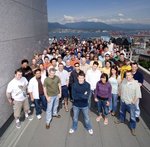Interviews// Turok Walks Again
We decide there was no point in remaining independent...
Check out the on-site first looks at Turok right here!
SPONG: What’s the general feeling at BVG about moving towards more adult games, as they are used to children’s games and this could be a minefield for them?
JH: If you think of the broader spectrum of the Walt Disney Company and all of its brands – you know, if you look at what’s available on ABC and ESPN, and some of the stuff that has been put out with Miramax and Touchstone – it’s such a large, influential media company that if you look at it from that perspective, it’s not much of a stretch. When you talk to BVG about their larger strategic vision of how they are going to grow as a gaming company, then they see how important it is to broaden their demographic.
SPONG: Do you think we will ever see a Turok film, now that Disney is publishing the game?
JH: If that happened, I’d be overjoyed. I think it would make a great film, or even a great theme park ride. But obviously, it’s not for me to decide.
SPONG: BVG bought Propaganda just a few months after you started up. Had you been talking to them before you started the company?
JH: We, as a group, had gotten together in the twilight hours of 2004, and left EA Canada, saying let’s start a studio. At that point, we just started talking to publishers throughout the industry, so it wasn’t that BVG was the only publisher we were in discussions with. But as we started to talk about our goals and visions for the studio, and their goals and visions for the division, plus how they wanted to develop as a publisher, we just found that there was a real synergy there.
So we started working for them as an independent developer. As an in independent developer, you have a choice to make: you can remain independent and chase that long-term big dollar sign, selling out and making a lot of coin. But the flipside of that is that you’ve got to put food on the table, and you’d be at risk of going under at any moment. We weighed that up against being part of BVG, where we felt there was that synergy, and you had the stability of being part of one of the world’s largest media companies. We decide there was no point in remaining independent, especially given that they were so supportive of our creative process.
SPONG: It must be very difficult getting funding when you’re a start-up?
JH: Absolutely. But I do think there are so few developers out there that are truly independent, because any time there is a strong team out there, publishers are looking to tie it up.
SPONG: Do you think there has been a shift in the balance of power between developers and publishers – in favour of developers – in recent years?
JH: Perhaps. I think now that games are so expensive - that’s it’s such a huge endeavour to take on triple-A titles for next-generation consoles – there’s a huge amount of money that you’re putting at risk. As the industry is maturing, developers have come to realise that, if a publisher is willing to put up the money, then to some extent the publisher has the right to have a bit more of the balance of power tipped in their favour. But I do think that the great developers who prove themselves in the industry are going to have a great deal of power, simply because they are so few and far between.
SPONG: What’s the general feeling at BVG about moving towards more adult games, as they are used to children’s games and this could be a minefield for them?
JH: If you think of the broader spectrum of the Walt Disney Company and all of its brands – you know, if you look at what’s available on ABC and ESPN, and some of the stuff that has been put out with Miramax and Touchstone – it’s such a large, influential media company that if you look at it from that perspective, it’s not much of a stretch. When you talk to BVG about their larger strategic vision of how they are going to grow as a gaming company, then they see how important it is to broaden their demographic.
SPONG: Do you think we will ever see a Turok film, now that Disney is publishing the game?
JH: If that happened, I’d be overjoyed. I think it would make a great film, or even a great theme park ride. But obviously, it’s not for me to decide.
SPONG: BVG bought Propaganda just a few months after you started up. Had you been talking to them before you started the company?
JH: We, as a group, had gotten together in the twilight hours of 2004, and left EA Canada, saying let’s start a studio. At that point, we just started talking to publishers throughout the industry, so it wasn’t that BVG was the only publisher we were in discussions with. But as we started to talk about our goals and visions for the studio, and their goals and visions for the division, plus how they wanted to develop as a publisher, we just found that there was a real synergy there.
So we started working for them as an independent developer. As an in independent developer, you have a choice to make: you can remain independent and chase that long-term big dollar sign, selling out and making a lot of coin. But the flipside of that is that you’ve got to put food on the table, and you’d be at risk of going under at any moment. We weighed that up against being part of BVG, where we felt there was that synergy, and you had the stability of being part of one of the world’s largest media companies. We decide there was no point in remaining independent, especially given that they were so supportive of our creative process.
SPONG: It must be very difficult getting funding when you’re a start-up?
JH: Absolutely. But I do think there are so few developers out there that are truly independent, because any time there is a strong team out there, publishers are looking to tie it up.
SPONG: Do you think there has been a shift in the balance of power between developers and publishers – in favour of developers – in recent years?
JH: Perhaps. I think now that games are so expensive - that’s it’s such a huge endeavour to take on triple-A titles for next-generation consoles – there’s a huge amount of money that you’re putting at risk. As the industry is maturing, developers have come to realise that, if a publisher is willing to put up the money, then to some extent the publisher has the right to have a bit more of the balance of power tipped in their favour. But I do think that the great developers who prove themselves in the industry are going to have a great deal of power, simply because they are so few and far between.
Read More Like This
Comments
I enjoyed the N64 sequel a lot. I hope they can improve on the previous Turok efforts. The thing that has plagued the series is its universe from the comics and having to bend within it. I'll give them a chance to sort it out mind.
Does the dinosaur thing work well when compared to stuff like GoW, Metroid or Halo? I think most people prefer biped human like opponents, unless you can use your imagination a create cool stuff like the spider thing in GoW.
Does the dinosaur thing work well when compared to stuff like GoW, Metroid or Halo? I think most people prefer biped human like opponents, unless you can use your imagination a create cool stuff like the spider thing in GoW.
raptors are biped...and fast...and deadly...and hunt in packs with diversion and sneaktactics...and attack with sharp claws and pointy theeth gnahgnahgnah...
If they can get their AI up to speed like that then bring it!
If they can get their AI up to speed like that then bring it!
more comments below our sponsor's message
I like how they say they took the story for the game and reimagined it... does no one even know "the story" is from a comic originaly. It's like they bought a game franchise with no regard to the fact that it wasnt original IP to begin with. I'm not huge fan of the comic but it's just odd. :/
____________
____________
hopefuly its better than evolution, bought it, was s**te, multiplayer was semi-decent, traded it in on games 10 day return thing, got timesplitters 2 and never looked back.


